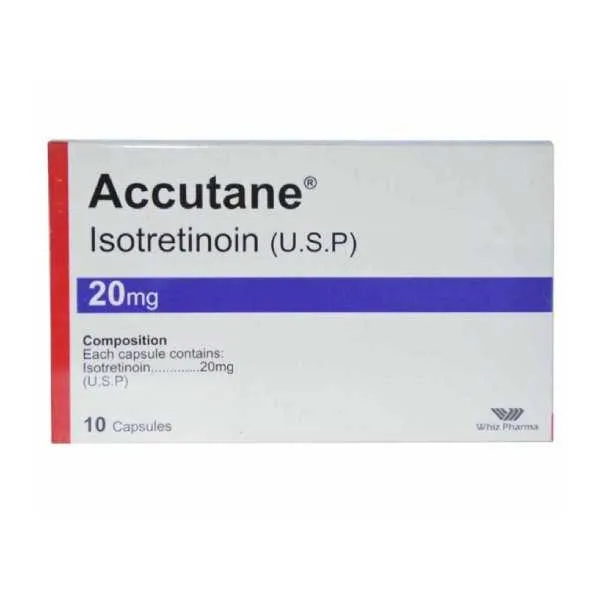Comprehensive Guide to Isotretinoin: Uses, Dosage, Side Effects, and More
What is Isotretinoin?
Overview of Isotretinoin
Generic Name: Isotretinoin
Brand Name: Accutane, Claravis, Absorica, generics
Drug Group: Retinoid (anti-acne, anti-inflammatory)
Commonly Used For
- Treat severe nodular acne.
- Manage recalcitrant acne unresponsive to other treatments.
- Prevent scarring from cystic acne.
Key Characteristics
Form: Oral capsules (10 mg, 20 mg, 30 mg, 40 mg) (detailed in Dosage section).
Mechanism: Decreases sebaceous gland activity and keratinization, reducing acne lesions.
Approval: FDA-approved (1982 for Accutane) and EMA-approved for severe acne.

Indications and Uses of Isotretinoin
Isotretinoin is indicated for a range of dermatological conditions, leveraging its powerful sebum-suppressing and anti-inflammatory effects:
Severe Nodular Acne: Treats inflammatory acne with nodules ≥5 mm, per dermatology guidelines, supported by clinical trials showing 80–90% clearance rates after a single course.
Recalcitrant Acne: Manages acne resistant to antibiotics and topical therapies, improving quality of life, recommended in acne management protocols.
Cystic Acne: Prevents scarring and reduces cyst formation, with evidence of reduced lesion counts within 8–12 weeks.
Rosacea (Inflammatory Type): Investigated off-label to control persistent redness and papules, with dermatology research.
Hidradenitis Suppurativa: Explored off-label to reduce abscesses and fistulae, supported by surgical dermatology studies.
Psoriasis (Severe Cases): Used off-label to manage refractory plaque psoriasis, with rheumatologic-dermatologic evidence.
Sebaceous Hyperplasia: Initiated off-label to shrink overactive sebaceous glands, with cosmetic dermatology data.
Chemoprevention of Skin Cancer: Investigated off-label in high-risk patients (e.g., post-organ transplant), with oncology-dermatology research.
Ichthyosis: Applied off-label to improve skin scaling in congenital ichthyosis, with pediatric dermatology evidence.
Acne Fulminans: Managed off-label in severe, sudden-onset acne with systemic symptoms, with emergency dermatology studies.
Dosage of Isotretinoin
Dosage for Adults
Severe Nodular Acne:
Initial: 0.5–1 mg/kg/day orally, divided into two doses with food, for 15–20 weeks.
Maintenance: Adjusted to 1–2 mg/kg/day based on tolerance, with a cumulative dose target of 120–150 mg/kg.
Recalcitrant Acne:
0.5–1 mg/kg/day, increased to 2 mg/kg/day if needed, for a minimum of 16 weeks or until clearance.
Dosage for Adolescents (≥12 years, Tanner Stage 2 or higher)
Severe Acne:
0.5–1 mg/kg/day, with a maximum of 2 mg/kg/day, under pediatric dermatology supervision, for 16–24 weeks.
Cumulative dose: 120–150 mg/kg, adjusted for growth and side effects.
Dosage for Pregnant Women
Pregnancy Category X: Contraindicated due to severe teratogenic risk; effective contraception is mandatory for females of childbearing potential.
Dosage Adjustments
Renal Impairment: No specific adjustment; monitor in severe cases (CrCl <30 mL/min) due to limited data.
Hepatic Impairment:
Mild to moderate (Child-Pugh A or B): Use cautiously with reduced dose (e.g., 0.5 mg/kg/day); severe (Child-Pugh C): Avoid.
Concomitant Medications: Avoid tetracyclines or vitamin A supplements to prevent additive toxicity; monitor liver function.
Elderly: Start with lower doses (e.g., 0.5 mg/kg/day); monitor for lipid changes and bone health.
Side Effect Management: Reduce dose or pause if severe dry skin, elevated triglycerides, or psychiatric symptoms occur.
Additional Considerations
- Take this active ingredient with a high-fat meal to enhance absorption (e.g., 50% increase with fatty food).
- Use only under the iPLEDGE program (USA) or equivalent monitoring for pregnancy prevention.
- Monitor lipid profiles and liver enzymes monthly during therapy.
How to Use Isotretinoin
Administration:
Oral: Swallow capsules whole with a meal or milk, avoiding crushing or chewing.
Take consistently at the same times daily to maintain steady levels.
Timing: Administer with breakfast and dinner to optimize absorption and reduce gastrointestinal irritation.
Monitoring: Watch for dry skin, joint pain, or mood changes (e.g., depression); report immediately.
Additional Tips:
- Store at 20–25°C (68–77°F), protecting from light and moisture.
- Keep out of reach of children due to teratogenic risk.
- Use moisturizers and lip balm daily to manage dryness; avoid waxing or dermabrasion during therapy.
- Schedule monthly follow-ups with blood tests (lipids, liver function) and pregnancy tests for females.
- Educate patients on sun protection (SPF 30+) due to photosensitivity risk.
Contraindications for Isotretinoin
Pregnancy: Contraindicated due to Category X status and risk of severe fetal malformations (e.g., craniofacial defects).
Breastfeeding: Contraindicated due to potential secretion in milk and infant toxicity.
Hypersensitivity: Patients with a known allergy to Isotretinoin or other retinoids.
Severe Hepatic Disease: Avoid in Child-Pugh Class C due to hepatotoxicity risk.
Hypervitaminosis A: Contraindicated in patients with excessive vitamin A intake to prevent toxicity.
Concurrent Tetracycline Use: Avoid due to increased intracranial hypertension risk.
Warnings & Precautions for Isotretinoin
General Warnings
Teratogenicity: High risk of birth defects; requires two forms of contraception for females of childbearing age.
Psychiatric Effects: Risk of depression, suicidal ideation, or psychosis; monitor mental health monthly.
Hepatotoxicity: Risk of elevated liver enzymes; check ALT/AST every 4 weeks.
Hyperlipidemia: Risk of increased triglycerides and cholesterol; monitor lipid profiles.
Pseudotumor Cerebri: Risk with concomitant tetracyclines; discontinue if headache or vision changes occur.
Additional Warnings
Bone Changes: Risk of premature epiphyseal closure or osteoporosis with long-term use; assess in adolescents.
Dryness Syndrome: Severe skin, eye, and mucosal dryness; use supportive care.
Inflammatory Bowel Disease (IBD): Rare risk of exacerbation; monitor for abdominal pain.
Night Vision Impairment: Risk of decreased dark adaptation; advise caution while driving.
Hypersensitivity Reactions: Rare severe reactions (e.g., Stevens-Johnson syndrome); stop if rash appears.
Use in Specific Populations
Pregnancy: Category X; absolutely contraindicated.
Breastfeeding: Contraindicated; avoid use.
Elderly: Use with caution; monitor for lipid and bone effects.
Children: Safe for adolescents with acne under supervision.
Renal/Hepatic Impairment: Adjust or avoid in severe cases.
Additional Precautions
- Inform your doctor about mental health history, liver disease, or pregnancy plans before starting this medication.
- Avoid sun exposure and use sunscreen to prevent photosensitivity reactions.
- Report any vision changes, severe headaches, or mood swings immediately.
Overdose and Management of Isotretinoin
Overdose Symptoms
- Mild symptoms (e.g., headache, nausea, vomiting) or skin irritation.
- Severe cases: Elevated intracranial pressure, severe hypervitaminosis A, or hepatic dysfunction.
- Drowsiness, dizziness, or abdominal pain as early signs.
- Coma or profound metabolic disturbances with extremely high doses.
Immediate Actions
Contact the Medical Team: Seek immediate medical help if overdose is suspected.
Supportive Care: Monitor vital signs, provide IV fluids, and manage symptoms (e.g., antacids for nausea).
Specific Treatment: No specific antidote; discontinue use and support liver function if needed.
Monitor: Check liver enzymes, lipid levels, and intracranial pressure for 24–48 hours.
Patient Education: Advise against self-dosing and to store securely away from children.
Additional Notes
- Overdose risk is linked to accidental ingestion; keep out of reach of others.
- Report persistent symptoms (e.g., severe headache, yellowing skin) promptly.
Side Effects of Isotretinoin
Common Side Effects
- Dry Skin (80–90%, managed with moisturizers)
- Chapped Lips (70–85%, relieved with lip balm)
- Dry Eyes (40–60%, treated with artificial tears)
- Nosebleeds (15–30%, reduced with humidifiers)
- Joint Pain (10–20%, alleviated with rest)
These effects may subside with adaptation or dose adjustment.
Serious Side Effects
Seek immediate medical attention for:
- Psychiatric: Depression, suicidal thoughts, or psychosis.
- Hepatic: Jaundice or liver failure.
- Ocular: Vision loss or corneal opacities.
- Gastrointestinal: IBD or pancreatitis.
- Teratogenic: Fetal abnormalities (in pregnancy).
Additional Notes
Regular monitoring with monthly blood tests (lipids, liver function) and psychiatric evaluations is essential.
Patients with a history of IBD should be closely watched for abdominal symptoms.
Vision changes require urgent ophthalmologic assessment to rule out pseudotumor cerebri.
Report any unusual symptoms (e.g., mood swings, severe abdominal pain) immediately to a dermatologist.
Long-term use (>6 months) requires bone density scans to assess skeletal health.
Drug Interactions with Isotretinoin
This active ingredient may interact with:
- Tetracyclines: Increases intracranial hypertension risk; avoid combination.
- Vitamin A: Enhances toxicity; avoid supplements.
- Oral Contraceptives: May alter efficacy; use non-hormonal backups if needed.
- Phenytoin: Potentiates hepatotoxicity; monitor liver function.
- Alcohol: Exacerbates hyperlipidemia; limit intake.
Action: Provide your dermatologist with a complete list of medications.
Patient Education or Lifestyle
Medication Adherence: Use this retinoid as prescribed for acne, following the daily schedule.
Monitoring: Report mood changes, dry eyes, or signs of liver issues immediately.
Lifestyle: Avoid sun exposure; use gentle skincare products.
Diet: Limit vitamin A-rich foods; avoid alcohol.
Emergency Awareness: Know signs of depression or vision changes; seek care if present.
Follow-Up: Schedule monthly check-ups to monitor blood work and mental health.
Pharmacokinetics of Isotretinoin
Absorption: Oral, peak at 2–4 hours; bioavailability ~25–30% (increases with fat).
Distribution: Volume of distribution ~0.9 L/kg; 99.9% protein-bound.
Metabolism: Hepatic via CYP2C8, CYP2C9, and CYP3A4 to 4-oxo-isotretinoin.
Excretion: Primarily biliary (20–30%) and renal (50–60% as metabolites); half-life 10–20 hours.
Half-Life: 10–20 hours, with active metabolites persisting longer.
Pharmacodynamics of Isotretinoin
This drug exerts its effects by:
Reducing sebaceous gland size and sebum production via retinoid receptor activation.
Normalizing keratinization and decreasing Propionibacterium acnes proliferation.
Alleviating acne lesions over 12–16 weeks of therapy.
Exhibiting dose-dependent risks of teratogenicity and hyperlipidemia.
Storage of Isotretinoin
- Temperature: Store at 20–25°C (68–77°F); protect from light and moisture.
- Protection: Keep in original container, away from heat and humidity.
- Safety: Store in a secure location out of reach of children and teens due to teratogenic risk.
- Disposal: Dispose of unused capsules per local regulations or consult a pharmacist.
Frequently Asked Questions (FAQs)
Q: What does Isotretinoin treat?
A: This medication treats severe acne.
Q: Can this active ingredient cause dry skin?
A: Yes, dry skin is common; use moisturizers.
Q: Is Isotretinoin safe for teens?
A: Yes, with supervision and monitoring.
Q: How is this drug taken?
A: Orally with food, as directed.
Q: How long is Isotretinoin treatment?
A: Typically 15–20 weeks per course.
Q: Can I use Isotretinoin if pregnant?
A: No, it is contraindicated; use contraception.
Regulatory Information
This medication is approved by:
U.S. Food and Drug Administration (FDA): Approved in 1982 (Accutane) for severe acne, with iPLEDGE program.
European Medicines Agency (EMA): Approved for nodular acne unresponsive to other treatments.
Other Agencies: Approved globally for acne; consult local guidelines.
References
- U.S. Food and Drug Administration (FDA). (2023). Accutane (Isotretinoin) Prescribing Information.
- Official FDA documentation detailing the drug’s approved uses, dosage, and safety.
- European Medicines Agency (EMA). (2023). Isotretinoin Summary of Product Characteristics.
- EMA’s comprehensive information on the medication’s indications and precautions in Europe.
- National Institutes of Health (NIH). (2023). Isotretinoin: MedlinePlus Drug Information.
- NIH resource providing detailed information on the drug’s uses, side effects, and precautions.
- World Health Organization (WHO). (2023). WHO Model List of Essential Medicines: Isotretinoin.
- WHO’s consideration of Isotretinoin for severe acne.
- Journal of the American Academy of Dermatology. (2022). Isotretinoin in Acne Management.
- Peer-reviewed article on Isotretinoin efficacy (note: access may require a subscription).
